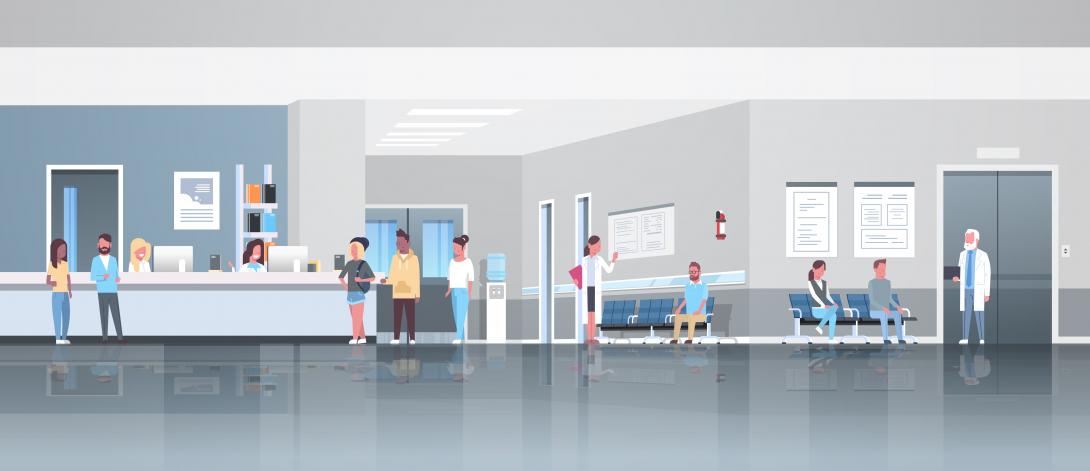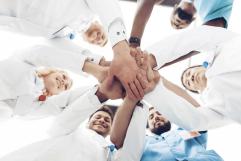
The smart patient enters the consulting rooms
They are seeking proven information, demanding second and third medical opinions, they are experts in their illnesses and they want to take part in the decision-making about their health.
Patients have changed their attitudes and want to take control of their health. They are demanding, they look for proven information and they ask for more than one opinion. This is affirmed by Genís Carrasco, Doctor in Medicine and Surgery, specialist in Intensive Care Medicine at the SCIAS Hospital in Barcelona and author of the essay El paciente inteligente/The smart patient (Sello Editorial). “They are no longer passive patients,” he states, “They have adopted a new attitude to medical practice, which they have taken to the same level as other services,” Carrasco adds.
This is a type of patient that arose in the US in the 1980s with the Smart Patient movement and that arrived in Spain in the year 2000. Since then many Schools of Patients have been created, such as the one promoted by the Health Council of La Rioja or the Andalusian Public Health School. “They involve classes, meetings and workshops for patients, particularly chronic patients, aimed at making them into experts in their illness and making better decisions,” Doctor Carrasco states. And although “the expert chronic patient is the one most seen,” now many people come to the Doctor’s consulting room having looked for information on the internet. “The patients want to take on a more prominent role and they are entitled to this. They want to be at the centre of the health system, to participate and to make decisions,” according to Carrasco.
“A Medical philosopher said that the most important thing that happened in the 21st century was not the invention of the scanner or the Pet scan; the true revolution was this new smart patient who wants to take a leading role,” the expert recalls. “It is an unstoppable reality and as professionals we must accept this movement, jump on the bandwagon and change the classic paternalism,” the doctor recommends. The fact is that this new movement, although it has now come of age, has caught healthcare professionals by surprise.
21 seconds
“A book published in the USA called Smart Patient estimates that a doctor takes 21 seconds to interrupt the patient in an interview. I have consulted with several colleagues and they did not even last half a minute. As doctors, we find it hard to accept this change of paradigm, particularly the older generation. They have not become aware of the change and they have to adapt. I am sure that nurses have another view of healthcare and they have already adapted better to these changes,” Carrasco reflects.
And the reason behind this lies in the fact that the career of Medicine “still lies in the 19th century and does not respond to reality. They train you in specialities, when medicine is transversal. You receive no training in communication with patients, how to give bad news or how to put ourselves in the patient’s shoes,” the expert affirms, recalling that doctors learn all these skills “on the go and in the daily reality.”
“Medicine is increasingly becoming seen as just another service. But unlike a hotel, where the customer can appreciate a room with a view, what patients are looking for is a relationship with the professional. And a hospital will be good if I have gone there and found a orthopaedic surgeon who treated me as an equal and some nurses who have looked after me as I deserve,” the doctor reasons.
Humanising the system
The new technologies have also speeded this change up. “They involve areas of light and shadows. They have improved the technical part of medicine a great deal, but if they aren’t managed correctly, they become a barrier. If you end up looking at the screen more than at the patient and you don’t see it as a whole, it is bad. Because Mr. John does not only have Covid-19, he is also a widower, he is alone or with a small pension and overmedicated,” recalls Carrasco. “You must evaluate him overall and technology does not allow this if you only concentrate on it.” This is the reason for movements such as personalised medicine or the healthcare system centred on patients. “Yes to technology, but yes also to humanism in medicine, a movement that is trying to get back to a personal relationship and that is trying to see the patient as a human being and not as a specific illness.”
This means much more work for doctors in a healthcare system where time is always lacking. For Carrasco, “standardising treatments or treating everyone with protocols is easier, but it is more like an industrial process.” And one of the great problems of humanising medicine “is that the processes must also be humanised. I might be very in favour of this change, but if I am a family doctor and I have to see 60 patients in an hour, treating patients in a human manner is very difficult,” he affirms. “The exercising of standardised medicine, which wants to be productive and de-humanised is easier and cheaper for the system than personalised, human medicine,” he adds.
But the idea is not about choosing between one or the other, because “there is no choice.” “Patients legitimately demand that we incorporate the technology, they also want a humanistic view,” the expert states, indicating: “We have to move towards a personalised medicine that requires more time and resources.” Because society evolves in this way and the professionals must change along with it. “It is not medicine that changes society, but rather society that modifies the way we exercise medicine,” Carrasco adds. And for this reason “the smart patient movement is unstoppable because it responds to changes in society’s ethical values.”
Carrasco recalls that ethics appear when society starts not accepting the moral reasons of religion. “And this is the point when we must create some values and ethics agreed upon with citizens and adapt them to the changes. They are values that continuously evolve and that also change medicine. For example, euthanasia is now socially accepted, but 50 years ago, a large part of society looked at it with horror.”
Disinformation
“If you put garlic and AIDS on Google, thousands of news items will appear guaranteeing that garlic cures AIDS,” Carrasco denounces. “You can’t do open searches on internet about health subjects. Patients must learn to filter, “he states. “The Internet is a sea of disinformation where, sometimes, there is a fish of good information,” the expert states, recalling the scandal that arose in the first wave of the pandemic regarding whether those over the age of 80 could be admitted to the ICUs or not.
“Smart patients look for new sources and they contrasts them; those who do not have this capacity, which are the majority, listen to the media,” he states. “In Catalonia there was a circular from the Medical Emergencies System that seemed to say this, but this was not the case. I have been an ICU doctor for my entire professional career. We have always decided whether a patient is admitted or not according to a series of variables and we will continue acting according to our criteria, which are always in the patient’s benefit.” Carrasco categorically affirms, having written an article in Catalunyapress to clarify this point.
“This news item generated a great deal of anxiety for families with elderly members who thought that they would be left without any care. At the ICU where I work this has never happened,” he recalls. And the fact is, according to Carrasco, the monopoly of the information held by the doctors and the traditional media in this case was diluted on social media, where it can’t be contrasted. “It is not good for the traditional media to lose importance because social media is taking its place. Social media is useful, but you must know how to differentiate. The smart patient, while looking for information, acquires skills and develops a critical spirit,” Genís Carrasco concludes.
Intensive care and the writer
Genís Carrasco is the author of ‘El paciente inteligente’, a practical guide to discover our rights and duties. The book reveals the structure of public and private health, it offers advice to make a list of key questions before visiting the doctor and it gives us tools to understand both the doctors and the diagnosis. It also explains the 31 most frequent illnesses and syndromes and it gives us strategies to manage our health in times of crisis. “I became interested in the subject because my wife is an anthropologist and she made me see that we don’t notice the changes that happen in society. From this point onwards, I talked to patients associations and I wrote the book,” Carrasco explains. “We must help patients to move around in the world of medicine,” he states.
How do you filter information on the internet?
“Patients must get used to the idea that what is freely available on the internet is a sea of information that might not be real,” Carrasco explains. But, how can it be filtered? “It is not difficult,” the doctor affirms. “Learn by seeing who puts up the information; if it is a prestigious organism such as the WHO or a scientifically recognised entity, the information may certainly be true. Then look for quality seals, which are very useful. Here we have the one belonging to the Official College of Doctors of Barcelona ,” the expert mentions, who recommends mistrusting personal pages, blogs and information that does not provide a bibliography or that gives implausible information. “And if you are still not clear, you should talk to the doctor about it when you go to the consulting rooms because a medical professional can help you to filter.”
Exhausted personnel
In April the pandemic swept everything before it like a tidal wave with the healthcare system weakened by cutbacks. “The professionals responded magnificently,” Doctor Genís Carrasco acknowledges, warning that in this third wave, “The healthcare workers are exhausted.” “The problem now does not involve the number of ICU beds or the ventilators, but rather the lack of professionals to care for the patients, which is particularly serious in the case of nurses specialising in critical cases,” he states.
More demanding
The hygiene measures imposed by the pandemic worsened and determined the relationship between patients and doctors. “For epidemiological reasons this relationship takes place divided by face masks, face screens, protective goggles, PPEs… The nurses at the hospital wrote their names on their tunics because it was difficult to recognise them,” Carrasco explains. “We are living through a exceptional times, but when all this has passed, patients will continue demanding what they were asking for before the pandemic and with greater interest,” the expert adds, acknowledging: “Covid-19 has made us more demanding about everything and people who have gone through such hard times become more critical. Now they are having to give up their rights as patients and relatives to receive face-to-face information, but when society is aware that this situation has moved on, it will demand all these rights with greater insistence.”
Misinformation and Covid
80% of the information currently offered by the media refers to the pandemic. “Before Covid, studies indicated that 40% of internet searches were related to health. After the pandemic, this percentage will increase because there are more people who are aware of it and we might reach 60% of the total searches,” Carrasco explains. This means that in the huge sea of misinformation available on the internet, we must learn to look for solid, proven elements, which are guaranteed by the different seals of quality. Something that is difficult, but not impossible. According to the study 'Fake News in times of Covid-19. The invasion of misinformation,” prepared by EAE Business School, 44% of Spaniards found fake new son social media and messaging apps related to Covid-19, during the month of April, 2020.
The patent’s autonomy
“One of the ethic values accepted in European societies is patient autonomy,” Genís Carrasco explains. “This means that we must respect their capacity for making decisions,” he adds. Because patients have changed in recent years, they are better informed, they look for second and third opinions and they want to participate as a person and as a moral subject.


